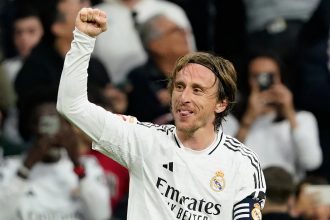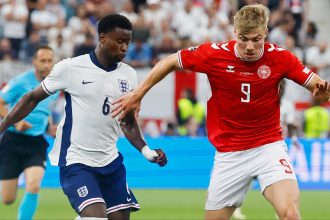Very rarely do teams have a chance to stop Los Blancos in Europe, and doing so would change narrative around Mikel Arteta's side
Article continues below
Article continues below
Article continues below
Manchester United. Manchester City. Chelsea. Liverpool. Tottenham Hotspur. West Ham United. Nottingham Forest. Aston Villa. Ipswich Town. What do these teams have in common?
The answer is they have all won European trophies which are still active. As you likey noticed, Arsenal – the third-most successful English club of all time by honours – are not named. The Gunners' failure to turn decades of domestic dominance into continental glory is a mystery to this day. It's not even as if they can blame it on a curse a la Benfica post-1962 European Cup triumph.
The north Londoners have won two defunct European tournaments: the Inter-Cities Fairs Cup, which was not run by UEFA until it was replaced with the UEFA Cup in 1971, and the Cup Winners' Cup, which was absorbed by the UEFA Cup (all hail the UEFA Cup, by the way). So it's not as if they're complete nobodies away from the British Isles, at least, even if their haul is slim compared to their rivals.
A new age is dawning in N5, however. Arsenal are on the verge of changing their European footprint for the better, penning a new legacy for a generation of hopefuls, dreamers and optimists. It all starts with Real Madrid.
Follow GOAL on WhatsApp! 🟢📱Getty Images SportEuropean failures
When Arsenal progressed to the quarter-finals of the 2009-10 Champions League, it seemed unthinkable they would have to wait another 14 years to reach that same stage again. Arsene Wenger's Gunners went on run of successive last-16 eliminations. It was, as it turned out, a neat summarisation of Arsenal's place in the European pecking order. They would dish out punishment to weaker sides, but were ultimately at the mercy of the other big boys.
At some point, if you're going to be taken seriously in Europe, you simply must show you can better a superior team over two games. Sure, Arsenal had the odd win against Barcelona and Bayern Munich here and there, but that was mainly born out of volume, they weren't actually the stronger side over 180 minutes.
Under Wenger, Arsenal became stuck in the same cycle every season. Have a slow summer to the anger of fans, results pick up over the autumn, there's a slip in the winter and then a springtime boost before scraping a top-four spot down the final stretch. Flaming out before the Champions League quarter-finals was as constant as any other checkpoint in the sequence, and it gave the Gunners a very unserious impression to the rest of the European Cup constants – they were there merely to take part.
AdvertisementGetty Images SportEven Europa League glory was beyond reach
When Wenger's grip on the top-four loosened, it began a ran of six successive seasons either in the Europa League or not in European competition at all. In their first jaunt back in the continent's second-tier tournament, they pushed eventual winners Atletico Madrid to the brink in the semi-finals, losing 2-1 on aggregate – the Gunners notably failed to make their one-man advantage count in the home leg after Sime Vrsaljko's red card, drawing 1-1 before a 1-0 defeat at the Estadio Metropolitano.
Bringing in Unai Emery, a noted Europa League specialist with three of his four career wins already under his belt at this point, only changed Arsenal's fortunes slightly. They went one step further and reached the final, but fell to London rivals Chelsea in a 4-1 thumping. Having also thrown away points needlessly down the stretch of the 2018-19 Premier League season, Arsenal were kept out of the Champions League for another year.
And then they truly entered the European wilderness. Mikel Arteta's arrival was soon followed by a shock last-32 Europa League exit to Olympiacos in added time at the end of the second leg's extra time. An eighth-place league finish was rescued by victory in the FA Cup, with Chelsea this time thwarted at Wembley, yet Arsenal were dealt a fatal blow by a vengeful Emery in the 2020-21 Europa League, as his Villarreal side dumped them out in the semis before beating Manchester United in the final.
Arsenal's 2021-22 campaign was their first without a European adventure since 1996, owing to finishing eighth again. They instead spent the year battling arch enemies Tottenham for the Premier League's final Champions League spot, with another inexplicable collapse in the final weeks of the season costing them that place. Another year in the Europa League beckoned, another relatively early exit, this time to Ruben Amorim's Sporting CP in the last-16, but at least they were able to punch their ticket back to the bright lights of the Champions League after finishing second. The years traversing the black-and-orange highways and byways of the Europa League were over.
Getty Images SportLessons learnt against Bayern
Arsenal's return to the top table began swimmingly. Even despite a 2-0 loss at Lens, they breezed through the old-format group stage with a game to spare. Porto, who just so happened to be the team Wenger's Gunners defeated in the 2010 knockouts, were drawn in the last 16, and this time it went the distance. The Gunners battled hard for over 180 minutes against Sergio Conceicao's dogged Dragons before prevailing on spot kicks in front of a home Emirates Stadium crowd. For the first time in a long time, they could boast being among Europe's top eight teams.
Bayern awaited in the quarters, and plenty of Arsenal fans had revenge on their minds for the previous maulings inflicted upon them. There was a confidence about them too, given their differing domestic fortunes, with Thomas Tuchel's side surrendering the Bundesliga title to Bayer Leverkusen and Arteta's men going stride for stride with Manchester City in the Premier League.
Once again, European pedigree proved the key differential. The German giants still played their own game, but a nervous Arsenal tightened, even after taking the lead early on in the first leg on home soil which ended 2-2. At the Allianz Arena, the visitors barely laid a glove on their hosts, who had Joshua Kimmich to thank for scoring the night's only goal.
A young manager in Arteta with a young team hanging on his word were still accumulating the scars necessary for education purposes. Arsenal played within themselves for the majority of the tie, rather than rising to the challenge. Their meticulous match-planning led them to playing the game rather than the occasion, but on those pressurised Champions League nights with the world watching on, it has to be the opposite.
Getty Images SportCutting off Madrid's head
Through 90 minutes of this year's quarter-final with Real Madrid, Arsenal have played with the emboldened attitude required. Arteta's rallying cry for the Emirates to create a cauldron of noise largely out of keeping with the ground's history worked, and the occasion of the first leg felt much more significant than the the year prior against Bayern.
It was therefore fitting that two of their goals in the 3-0 triumph were an expression of self-confidence, as well as perhaps a rejection of the micro-managing that had become the team's set-piece obsession, with Declan Rice thundering in two of the best free-kicks the game has ever seen anywhere 12 minutes apart. Makeshift striker Mikel Merino added the gloss with a brilliantly-taken goal soon after.
Arsenal will head to Santiago Bernabeu with a three-goal cushion, an almost unfathomable advantage to comprehend in the modern Champions League, let alone when you factor in their many European shortcomings that have lingered throughout their history and become the first stamp on the club's passport abroad. Since winning their famed 'La Decima' in 2014, Madrid have consistently found ways to win by any means necessary when the chips are down. Where Arsenal's European DNA has been constructed with shortfalls, Madrid's has mutated out of control with mythos and legend.
Arteta told the Spanish press that after the first leg he called Pep Guardiola to ask about facing Madrid, and the Catalan coach would have likely told him the tie's not over until that last whistle. Los Blancos are football's answer to Michael Myers, the team that flat out refuses to die. Guardiola's City were heavy favourites heading into their 2021-22 semi-final, and led by two goals going into stoppage time of the second leg. They somehow lost. One year on, the retooled Cityzens advanced from the same stage 5-1 on aggregate, metaphorically beating Madrid to a bloody pulp. That's the sort of ruthlessness you need to kill them on this stage.






